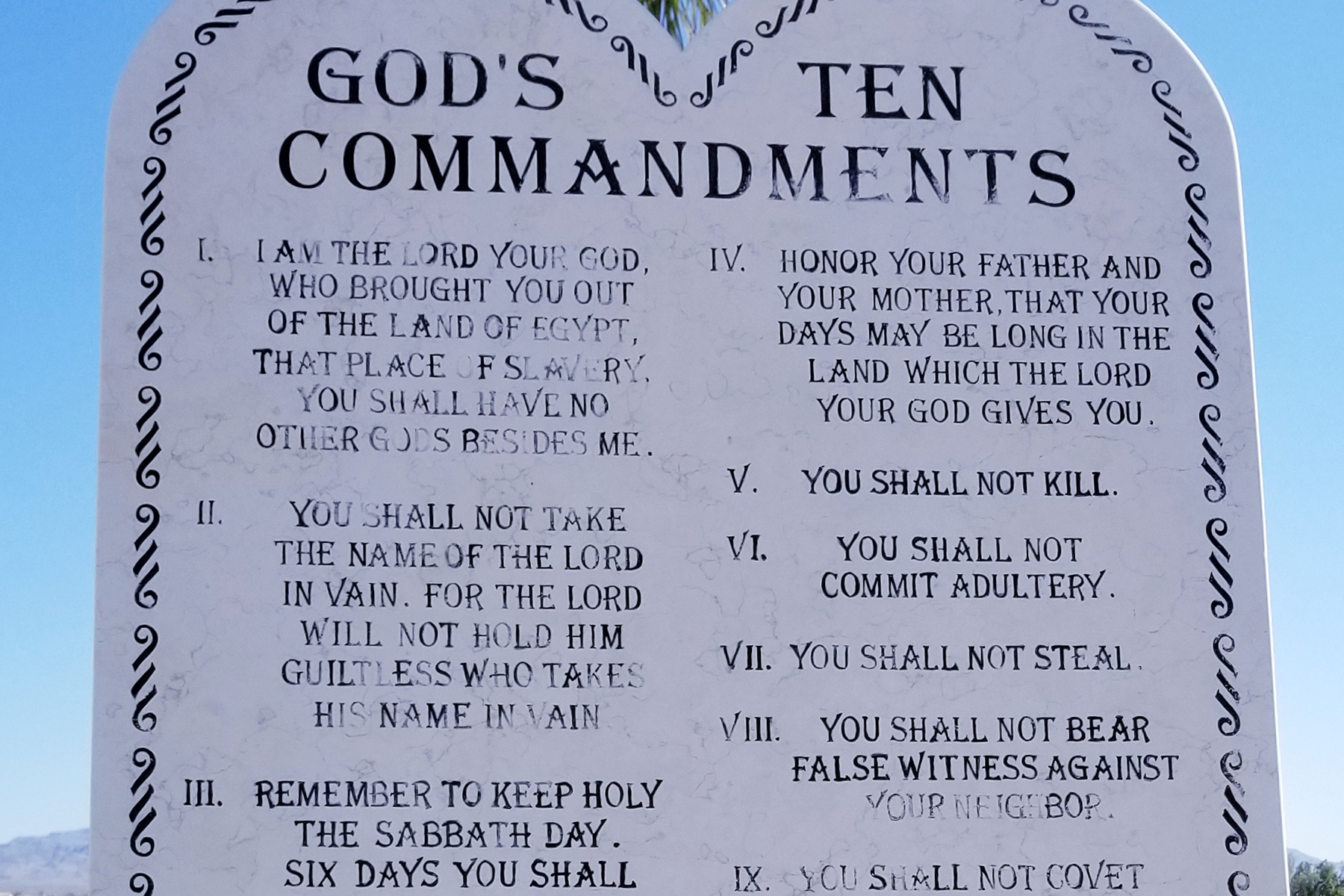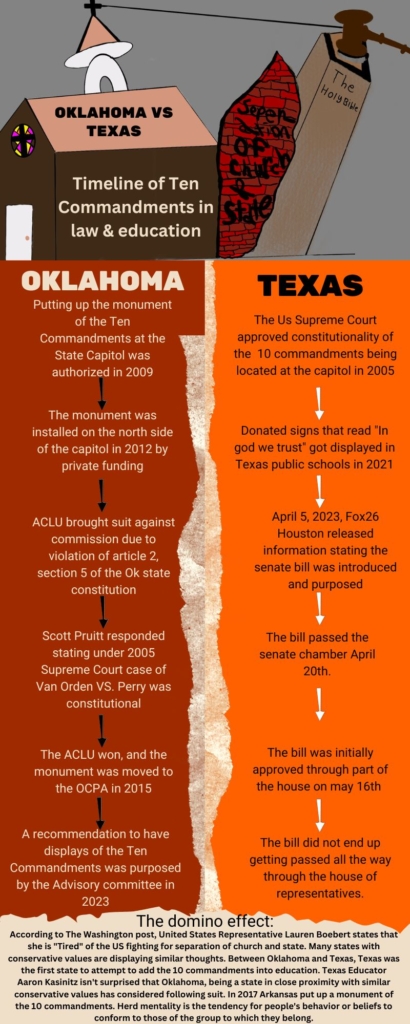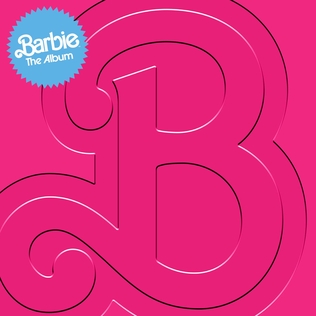By Kylee Crisswell, Yukon High School
Eight years after the Oklahoma Supreme Court ruled the Ten Commandments could not stand on state property, a new push would propose putting them into public schools. The recurring debate over whether this is constitutional is once again coming back into the public eye.
The state superintendent of education recently received a recommendation to place displays of the Ten Commandments in public school classrooms. This suggestion was proposed by the Advisory Committee of Foundational Principles. This committee is independent and not tied to the state government. The committee is made up of people from different backgrounds, including a Baptist minister, the Rev. Wade Burleson.
“(The committee) includes a Cheyenne Indian woman,” Burleson said. “It includes an immigrant from the Czech Republic, it includes myself, an African American, former Muslim, and another Christian,” Burleson said.
He feels that this committee is meant to represent the diverse population of America. The proposal holds its value in a historical context. The committee does not have final approval and the letter the advisory committee wrote is just in the beginning of the review process.
“What is the goal? It is not to make people Christian, It is not to make people Muslim. It is not to make people Jewish. It is not even to make people religious,” Burleson said. “It is to help Americans understand that our country was founded upon the principles of faith in nature’s God, and in nature’s law.”
He goes on to explain how this is what the founding fathers of America believed in. Texas proposed placing the Ten Commandments in public education before Oklahoma, though the bill did not get much further than the Senate.
Aaron Kasinitz is a journalism teacher at Heritage High School in Frisco, Texas. He discussed his concern about ensuring that no students feel excluded, especially those of other religious backgrounds.
“I think there is some historical value (in the commandments). What’s important to me as an educator is that we aren’t making any students feel less than,” Kasinitz said.
Burleson speaks to this point explaining his view of placing the commandments in public education.
“If I thought somebody was trying to convert my child, I would push back so I don’t blame people for pushback,” Burleson said.
Between Oklahoma and Texas, Texas was first to make this proposal, however the Texas bill was passed through the Senate before it was shot down due to missing a crucial House vote before a midnight deadline. Kasinitz’s main concern is how this could impact the culture and social dynamics of the student body. There are ways students could push back if those students feel there is an impact necessary to address.
An Oklahoman, 16 year old junior Sullivan Arnold who attends Epic Charter Schools, has similar views to Kasinitz, in terms of how advancing the recent recommendation could cause a cultural shock in schools. Though he is not opposed to having the commandments displayed, Arnold understands how this could cause potential problems. The student himself identifies as an agnostic.
“I definitely think there could be somewhat of a negative impact if they are forcing a specific religion onto somebody (of another faith), or no religion at all,” He said. “You are free to believe there is no higher power. If they could find a way to exclude (the first commandment) I wouldn’t see an issue with that either. I feel like that might be semi beneficial.”
Additionally, he does think the commandments hold importance and having posters displayed in schools isn’t inherently wrong. However, he draws the line at forced religion.
“Personally, I think what (the Ten Commandments) preach isn’t a bad thing and I think it should be spread around. Now, I’m not going to say I think Christianity should be forced upon somebody,” Arnold said.
While he mentions this concern, the letter the committee wrote looks at the commandments as a piece of historical context America was founded on. The proposal letter states as follows: “Our nation’s founding principles are built on dependence on Nature’s God and His laws (see the Declaration of Independence). As stated on America’s currency, ‘IN GOD WE TRUST.’”
The Rev. Stephen Hamilton, advisory committee chairman, had a hand in writing the proposal letter. Hamilton points out that the recommendation was made to the education department only a few weeks ago. There’s been some publicity, although not enough for students, parents, and educators to understand the committee’s intent.
“(The proposal to the state superintendent) has gotten some publicity, but not a whole lot of publicity,” Hamilton said. “I would imagine following up from that, when it comes to answering the questions, what does this mean? What is this about? Are there problems with that? Are there concerns with the recommendation? How do we explain them? How do we get around them? I think that (publicity) is the next phase, if you will, of trying to answer those very good questions.”
The letter was a document that explicitly stated what the committee was requesting and nothing more.
“For the purposes of a brief document, so to speak, to make a recommendation to the department, we didn’t spell out those details,” Hamilton said.
Even though this is a new proposal, it has a correlation to the past.
A monument of the Ten Commandments was displayed at the Oklahoma State Capitol until 2015.
That ended after the American Civil Liberties Union fought against the state with a lawsuit filed by Bruce Prescott, a Baptist minister from Norman. He believed having the Ten Commandments publicly displayed violates the Oklahoma constitution.
Prescott told NPR that he is happy with the outcome which was decided June, 30, 2015. of the lawsuit brought forth by the ACLU. The Oklahoma Supreme Court ruling was successful in forcing the monument to be moved off of the State Capitol grounds to the Oklahoman Council of Public Affairs office.
“I’m glad we finally got the governor and attorney general to agree to let the monument be moved to private property, which is where I believe it’s most appropriate,” Prescott said.







